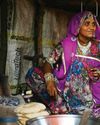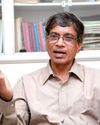A social media campaign aims to bridge gaps between communities by urging people to visit ‘people unlike us’

As Zahida Shabnam, a history professor and a television anchor, stepped into one of the ghettoes of the Gadiya Lohar community in Jaipur on a sunny Saturday recently, the women there did not seem too keen to let her mingle with them. in her blue cotton kurti, Shabnam seemed to typify to them an NGO worker. prejudice raised its hood in minds of the women of the nomadic tribe, in their colourful ghaghras and vibrant rajasthani ornaments.
“They were not too happy about the local NGO workers they were familiar with,” says Shabnam. These workers would just click pictures, make promises, but never return to do any real work, they complained to her when the ice was broken. For that to happen, Shabnam had to tell them that she was there to actually understand the lives of the Gadiya Lohars, to know the community and its culture better. on the spot she found hersef invited to a Gadiya Lohar wedding that was taking place the same day. The women gave her a black and golden ghaghra and some of their lighter ornaments. Shabnam says she never imagined it would happen, but found herself joining the women in their traditional dance, with which the baraat begins. “in their community, women do not accompany the baraat, but the men asked me to join them if i wished. it was such a big gesture on their part. i did not go, as i didn’t have enough time. i stayed with the women instead, and helped them cook lunch, and mingled with their children,” she says. By the time she was leaving, such a good bond had been formed with them that the farewell was an emotional affair.
هذه القصة مأخوذة من طبعة August 15, 2017 من GovernanceNow.
ابدأ النسخة التجريبية المجانية من Magzter GOLD لمدة 7 أيام للوصول إلى آلاف القصص المتميزة المنسقة وأكثر من 9,000 مجلة وصحيفة.
بالفعل مشترك ? تسجيل الدخول
هذه القصة مأخوذة من طبعة August 15, 2017 من GovernanceNow.
ابدأ النسخة التجريبية المجانية من Magzter GOLD لمدة 7 أيام للوصول إلى آلاف القصص المتميزة المنسقة وأكثر من 9,000 مجلة وصحيفة.
بالفعل مشترك? تسجيل الدخول

the trump phenomenon
how the 2016 election exposed the us underbelly.

chinnamma is not amma
sasikala may have become the leader of the aiadmk, but she is a far cry from j jayalalithaa, who towered over tamil nadu politics like a colossus.

sakshi malik
sakshi malik is the first indian female wrestler to bag an olympic medal. the 24-year-old comes from mokhra village of rohtak, haryana. she came into the limelight as an international wrestler after she won bronze in the junior world championship in 2010. then, she went on to win silver in the commonwealth games in 2014 and a bronze at the asian wrestling championships in 2015. after rio olympics, malik was conferred india’s highest sporting honour – the rajiv gandhi khel ratna. she is also the brand ambassador of the beti bachao, beti padhao campaign in haryana.

Across The Threshold
A social media campaign aims to bridge gaps between communities by urging people to visit ‘people unlike us’

'How Can An Insurance Firm Promote Death?'
Dr Pankaj Chaturvedi, head and neck cancer surgeon at the Tata Memorial hospital in Mumbai, is a leading antitobacco activist. He joined hands with Sumitra Hooda Pednekar and others to file a PIL in the Bombay high court earlier this year, questioning the staterun insurance firm LIC’s investments in a leading cigarette-maker company. Edited excerpts from an interview with Geetanjali Minhas:

The Wolf And The Lamb
Social injustice and the fate of the university

"Young Dalit Leaders Have Age, Situation On Their Side"
How do you see the rise of the Bhim Army in Uttar Pradesh?During the last assembly elections in UP, it was a common consensus among many [dalit leaders] that we’d give one more chance to Mayawati.

Timely Delivery
A veteran bureaucrat explains how to complete government projects without time and cost overruns.

Cauvery Water Dispute
India’s leading water expert and president of the South Asia Consortium for Inter disciplinary Water Resources Studies, S Janakarajan, wonders why Chennai, a city that receives 1,250 mm rainfall, is called a thirsty city and goes on to explain to Shivani Chaturvedi what went wrong among the southern states that led to a water-war like situation. But, he warns that such a scenario will keep occurring if the government does not come up with a lasting solution.

Case Against Cash
Can you imagine a day without cash?